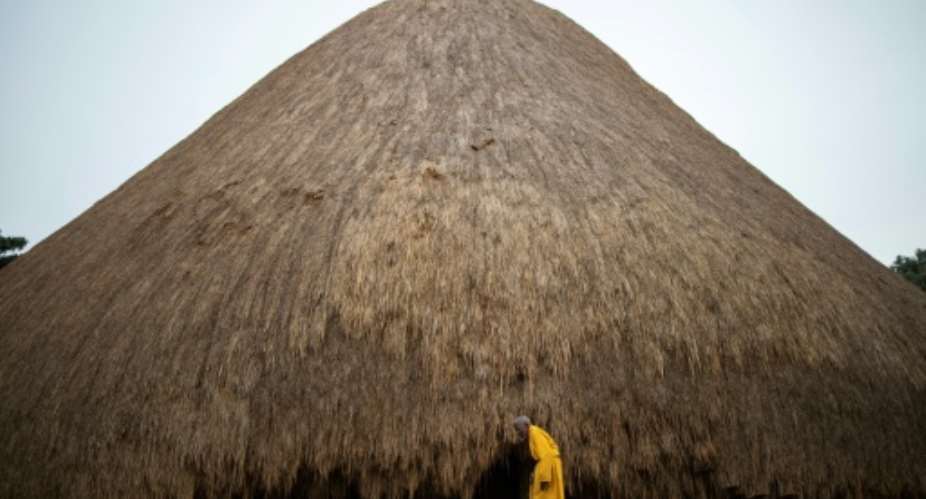UN cultural agency UNESCO announced Tuesday it was removing the fire-damaged tombs of royal leaders in Uganda from its endangered heritage list, saying it was satisfied with restoration efforts.
The decision on the Tombs of Buganda Kings was passed by the World Heritage Committee at a meeting in the Saudi capital Riyadh from September 10-25.
Housed in grass-thatched buildings on a hillside in the capital Kampala, and revered as an important historical and spiritual site for the Baganda people, the tombs were declared a UNESCO World Heritage Site in 2001.
But a 2010 fire devastated the site, and it was placed on the heritage in danger list while reconstruction began with the help of international funding.
It was completed in the summer of 2023 "allowing the site to return to its desired state of conservation", UNESCO said in a statement.
"This reconstruction is a collective success: that of the Ugandan authorities, Ugandan heritage professionals, but also the local communities who were at the heart of the process," said UNESCO director-general Audrey Azoulay.
 Artisans work on circular rings in the ceiling at the Kasubi Royal Tombs in Kampala. By Stuart Tibaweswa (AFP/File)
Artisans work on circular rings in the ceiling at the Kasubi Royal Tombs in Kampala. By Stuart Tibaweswa (AFP/File)
"This is excellent news for the entire international community, as we have made it a priority for World Heritage to give more space to African sites."
Ahead of the decision, UNESCO had said removing the tombs from the endangered list would be a powerful symbol given that 50 percent of sites considered in danger are in Africa.
The fire destroyed a main tomb building described as an "architectural masterpiece" but UNESCO said it was happy with the restoration and that of other iconic structures.
"It was also satisfied with the establishment of an advanced fire-fighting system and the training of volunteer firefighters among residents in order to prevent such a tragedy from happening again."
Buganda, one of four ancient kingdoms in the East African country, was first established in the 14th century on the shores of Lake Victoria, and includes Uganda's modern-day capital.
The Baganda make up the largest ethnic grouping in Uganda and their kingdom was granted considerable autonomy after independence from Britain in 1962.
But independence leader Milton Obote went on to outlaw the tribal kingdoms and forced the Kabaka into exile.
The bush war that brought Obote's rival Yoweri Museveni to power in 1986 was successful largely due to support from Buganda.
Museveni still rules today, but relations between the Baganda people and the government have been strained in more recent times.





 We saved $57.9million from procurement of new verification devices, registration...
We saved $57.9million from procurement of new verification devices, registration...
 Ejisu by-election: Aduomi is a betrayer – Ahiagbah
Ejisu by-election: Aduomi is a betrayer – Ahiagbah
 Dumsor: I’ll be in police custody if I speak, I vex — DKB
Dumsor: I’ll be in police custody if I speak, I vex — DKB
 We'll give daily evidence of Akufo-Addo's supervised thievery from our next gene...
We'll give daily evidence of Akufo-Addo's supervised thievery from our next gene...
 Asiedu Nketia crying because they've shared the positions and left him and his p...
Asiedu Nketia crying because they've shared the positions and left him and his p...
 Mahama's agenda in his next 4-year term will be 'loot and share' — Koku Anyidoho
Mahama's agenda in his next 4-year term will be 'loot and share' — Koku Anyidoho
 If you're president and you can't take care of your wife then you're not worth y...
If you're president and you can't take care of your wife then you're not worth y...
 Foreign Ministry caution Ghanaians against traveling to Northern Mali
Foreign Ministry caution Ghanaians against traveling to Northern Mali
 GHS warns public against misuse of naphthalene balls, it causes newborn jaundice
GHS warns public against misuse of naphthalene balls, it causes newborn jaundice
 Our education style contributes to unemployment - High Skies College President
Our education style contributes to unemployment - High Skies College President
